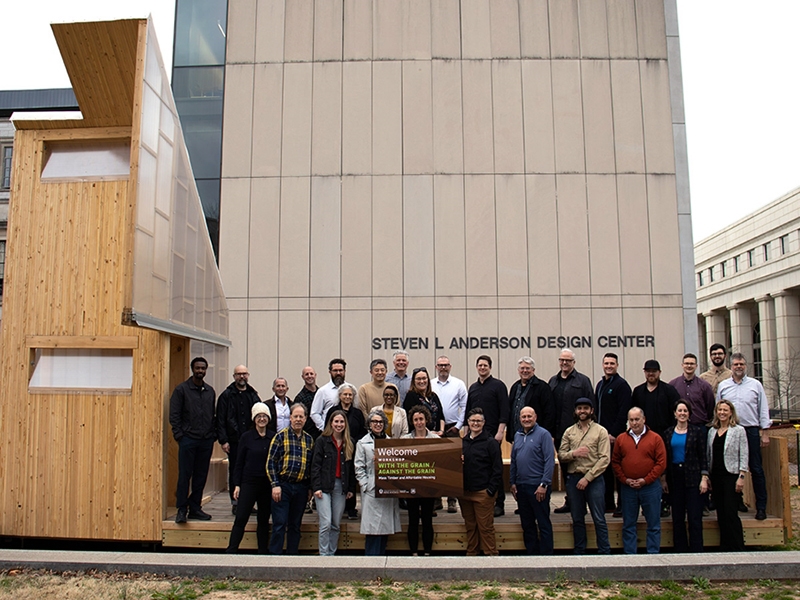
The Fay Jones School of Architecture and Design, in partnership with the USDA Forest Service Wood Innovations Program, hosted "With the Grain / Against the Grain," a workshop on mass timber for affordable housing, March 13-14 on the U of A campus.
In collaboration with the Forest Service's Wood Innovations Program, the Fay Jones School hosted this workshop that brought together a consortium of recent Wood Innovations Grant Program recipients focused on affordable and workforce housing utilizing mass timber and other innovative wood products/by-products, along with partners in industry, real estate, government, higher education and design.
By gathering this diverse group of partners, the Fay Jones School and the Forest Service's Wood Innovations Program hope to build a collaborative learning environment through which participants can learn from and build upon each other's project work and experiences. The intent is to identify barriers and solutions to the design, manufacturing and construction of affordable housing, and to explore how participants can move toward a vision of sustainable, affordable housing in mass timber and other wood products. More generally, the workshop aimed to catalyze housing that is more readily reproduced, more swiftly scaled up, and economical and affordable.
"Our partnership with the U.S. Forest Service Wood Innovations Program continues to pay dividends," said Peter MacKeith, dean of the school. "Not only has the school's research agenda in mass timber and affordable housing benefitted directly, but we're now also able to provide coordination and leadership to the emerging national efforts across a range of partners and allies. We look forward to further work together to address this critical issue, not only for our region but for the nation."
The workshop focused on specific issues that were discussed and identified during a preliminary group meeting in Portland, Oregon, in spring 2023, including financial structures, building codes, technology transfers, scaling up of solutions and rural/urban options, among others. This workshop aimed to identify, focus on and discuss real-world issues and needs that are hindering growth opportunities.
"Markets for mass timber support healthy and resilient forests for all landowners, and mass timber can be one solution to meeting housing construction needs across the country," said Brian Brashaw, assistant director of the Wood Innovations Program. "Our workshop was very valuable. Our partners helped identify needs, barriers and strategic opportunities for increasing the use of mass timber for housing."
Participants included a cross-section of diverse partners who have been studying and working on policy issues, manufacturing barriers and the design and construction of prefabricated housing — both rural and urban — with different potential growth opportunities.
Workshop participants included Africatown Community Land Trust, atelierjones, Atelier May, Gray Organschi Architecture, Green Canopy Node, Kaiser Group + Path Architecture, Leers Weinzapfel Associates, Mass Kingdom, Mercer Mass Timber, Michigan State University, Modus Studio, Northeast Forest Center, Shortstack Housing, Sierra Institute, Single Widget, Softwood Lumber Board, Sterling Solutions, Specialized Real Estate Group, Synergy, Inc., TallWood Design Institute, Timber Age Systems, U of A Community Design Center, University of Oregon, Urban Design Build Studio (UDBS) AR Home Lab, USDA Rural Development, the U.S. Forest Service and WoodWorks.
Participants had the opportunity to network, provide updates on their projects and provide recommendations to the Forest Service's Wood Innovations Program and other stakeholders and industry actors that focus on future investments needed that can stimulate the marketplace for affordable housing more so than on research efforts. The consortium also discussed policy, manufacturing, partnerships and how to move the industry forward, in part by reviewing and discussing some of the solutions various partners have developed at different governmental levels.
The workshop events were recorded and will be promoted initially through a specific consortium website that supports, and expands on, the numerous investigations into mass timber and housing. Upon completion of this meeting in Arkansas, the collective work undertaken through this grant will be compiled and designed into a printed book and distributed to participants and other interested parties. Importantly, the workshop intends to conclude with an action plan of substantial next steps and a timeline for effective action.
Topics
Contacts
Michelle Parks, director of communications
Fay Jones School of Architecture and Design
479-575-4704,